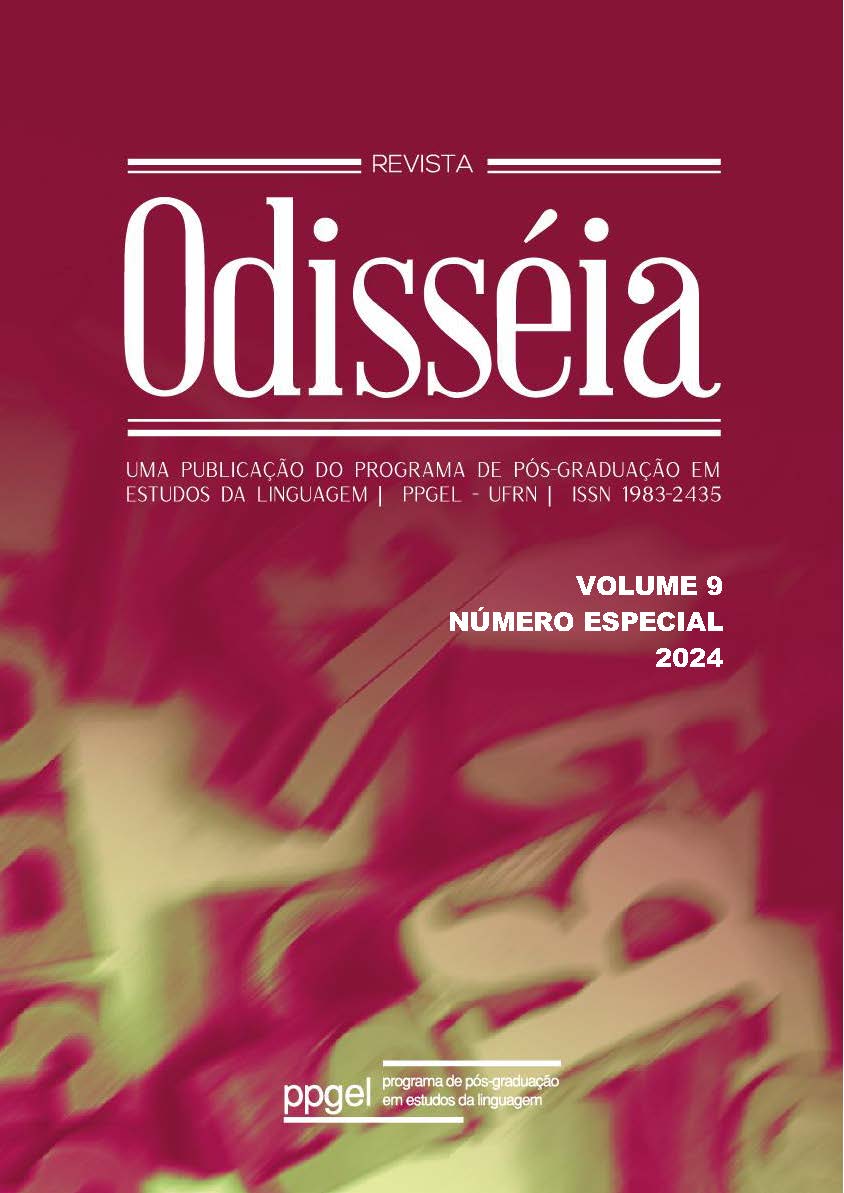Argumentação em contexto digital no ecossistema Twitter: estratégias tecnolinguageiras e funcionamento argumentativo em tuítes do perfil @folha
DOI:
https://doi.org/10.21680/1983-2435.2024v9nEspecialID34656Palavras-chave:
Tecnodiscursividade, Argumentação, Linguística Textual, Ecossistemas DigitaisResumo
Esta investigação visa analisar aspectos da tecnodiscursividade (Paveau, 2021) e da construção da argumentação (Amossy, 2017; 2018) em tuítes do perfil @folha selecionados com base em um recorte temático e temporal, em interface com a Linguística Textual (Cavalcante et al., 2020, 2022). Teoricamente, a análise guiou-se por dois referenciais de base: a concepção ampliada de argumentação de Amossy (2017), pleiteando uma análise argumentativa que contemple parâmetros concernentes ao texto; e o empreendimento teórico-metodológico, direcionado para a descrição e análise de discursos digitais nativos, delineado por Paveau (2021) para a Análise do Discurso Digital. Em confluência, acredita-se que o diálogo entre essas abordagens pode fornecer dispositivos relevantes para o analista investigar a complexidade de textualidades digitais que circulam em ecossistemas digitais, como o Twitter (hoje X). Amparada em uma abordagem qualitativa (Creswell, 2010), a análise dos tuítes gerados consistiu em: (i) geração dos dados para análise, na temática da política; (ii) descrição dos tuítes dos dados gerados a partir do ecossistema em que estão inseridos, o Twitter; (iii) identificação das estratégias tecnolinguageiras no perfil de @folha sobre essa temática, levando em conta categorias da Análise do Discurso Digital; e (iv) considerações acerca do funcionamento argumentativo dos tuítes em análise. A análise revelou que a @folha se vale, entre outros aspectos, da natureza compósita do tecnodiscurso, do fenômeno do tecnodiscurso relatado e do caráter dialogal da interatividade, permitido pelos retuítes e comentários, para apresentar fatos e embasar argumentos.
Downloads
Referências
AMOSSY, R. Apologia da polêmica. Coordenação de tradução Mônica Magalhães Cavalcante. São Paulo: Contexto, 2017.
AMOSSY, R. Argumentation et Analyse du discours: perspectives théoriques et découpages disciplinaires. Argumentation et Analyse du Discours, Tel-Aviv, n. 1, p. 1-18, 2008. DOI: https://doi.org/10.4000/aad.200. Disponível em: http://aad.revues.org/index200.html. Acesso em: 27 jun. 2024.
AMOSSY, R. A argumentação no discurso. Coordenação de tradução Eduardo Lopes Piris. São Paulo: Contexto, 2018.
AMOSSY, R. É possível integrar a argumentação na análise do discurso? Problemas e desafios. ReVEL, v. 14, n. 12, p. 165-190, 2016. Disponível em: https://revel.inf.br/files/f563cecec4f8b46afefe57c45529d721.pdf. Acesso em: 27 jun. 2024.
BOGGIO, Flávia. Negacionismo patriota. São Paulo, 18 jan. 2023. Twitter: @folha. Disponível em: https://twitter.com/folha/status/1615861692042301440. Acesso em: 19 jan. 2023.
CAVALCANTE, M. M. Abordagens da argumentação nos estudos de Linguística Textual. ReVEL, v. 14, n. 12, p. 106-124, 2016. Disponível em: https://repositorio.ufc.br/bitstream/riufc/51413/1/2016_art_mmcavalcante.pdf. Acesso em: 27 jun. 2024.
CAVALCANTE, M. M. et al. Linguística textual e argumentação. Campinas: Pontes Editores, 2020.
CAVALCANTE, M. M. et al. Linguística textual: conceitos e aplicações. Campinas: Pontes Editores, 2022.
CAVALCANTE, M. M. et al. O texto e suas propriedades: definindo perspectivas para análise. Revista (Con)textos Linguísticos. Linguística Textual e Análise da Conversação: conceitos e critérios de análise, v. 13, n. 25, p. 25-39, 2019. Disponível em: https://periodicos.ufes.br/contextoslinguisticos/article/view/27884/18764. Acesso em: 27 jun. 2024.
CRESWELL, J. W. Projeto de pesquisa: métodos qualitativo, quantitativo e
misto. Tradução Magda Lopes. 3. ed. Porto Alegre: Artmed, 2010.
EMERIT, Laetitia. La notion de lieu de corpus: un nouvel outil pour l’étude des terrains numériques em linguistique. Corela, Poitiers, v. 14, n. 1, p. 1-28, 2016. DOI: https://doi.org/10.4000/corela.4594. Disponível em: http://journals.openedition.org/corela/4594. Acesso em: 30 abr. 2023.
FARIAS, Tom. Anielle e Sônia Guajajara acenam com esperança de um país melhor. São Paulo, 18 jan. 2023. Twitter: @folha. Disponível em: https://twitter.com/folha/status/1615863170429591556. Acesso em: 19 jan. 2023.
GLÜCK, Eduardo Paré. A heterogeneidade tecnoenunciativa em um conjunto de tuítes reunidos pela hashtag #divulgaçãocientífica. Orientadora: Maria Eduarda Giering. Co-orientadora: Matilde Gonçalves. 2024. Tese de Doutorado (Doutorado em Linguística Aplicada) – Programa de Pós-Graduação Doutorado em Linguística Aplicada pela Universidade do Vale do Rio dos Sinos.
GZH. Elon Musk inicia mudança do nome do Twitter para X. 2023. Disponível em: https://gauchazh.clicrbs.com.br/tecnologia/noticia/2023/07/elon-musk-inicia-mudanca-do-nome-do-twitter-para-x-clkgq5s2m00030154p8pe3doa.html.
Acesso em: 10 nov. 2023.
KOCH, I. V.; ELIAS, V. M. Ler e Compreender: os sentidos do texto. 2. ed. São Paulo: Contexto, 2007.
LATOUR, B. Reagregando o Social. Bauru: EDUSC, Salvador: EDUFBA, 2012.
MOIRAND, S. A contribuição do pequeno corpus na compreensão dos fatos da atualidade. Tradutores Fernando Curtti Gibin & Julia Lourenço Costa. Revista Linguasagem, São Carlos, v.36, [S.l.], p. 20-41, jul./dez. 2020. Disponível em: https://www.linguasagem.ufscar.br/index.php/linguasagem/article/view/826/476. Acesso em: 27 jun. 2024.
PAVEAU, M.-A. Análise do discurso digital: dicionário das formas e das práticas. Organização Julia Lourenço Costa, Roberto Leiser Baronas. 1. ed. Campinas: Editora Pontes, 2021.
PAVEAU, M.-A. Ce qui s’écrit dans les univers numériques: matières technolangagières et formes technodiscursives. Itinéraires, [S.l.], p. 1-24, jan. 2015. DOI: https://doi.org/10.4000/itineraires.2313. Disponível em: https://journals.openedition.org/itineraires/2313. Acesso em: 20 mar. 2021.
PAVEAU, M.-A. Délinéarisation. In: DICTIONNAIRE (DADN). Technologies discursives L'analyse du discours numérique (ADN). [S.l.]: DADN, 2017. Disponível em: https://technodiscours.hypotheses.org/320. Acesso em: 20 mar. 2021.
PAVEAU, M.-A. L’écriture numérique. Standardisation, delinéarisation, augmentation. Fragmentum, Santa Maria, n. 48, p. 13-36, jul./dez. 2016. Disponível em: https://periodicos.ufsm.br/fragmentum/article/view/23296/15104. Acesso em: 5 mai. 2023.
PAVEAU, M.-A. Technodiscursivités natives sur Twitter: une écologie du discours numérique. Epistémè: revue internationale de sciences humaines et sociales appliquées, Séoul, [S.l.], n. 9, p. 139-176, set. 2013. Disponível em: https://hal.archives-ouvertes.fr/hal-00859064/document. Acesso em: 04 maio 2023.
PERELMAN, C.; OLBRECHTS-TYTECA, L. Tratado da argumentação: a Nova Retórica. Tradução: Maria Ermantina Galvão. 6. ed. São Paulo: Martins Fontes, 1996.
PINTO, R. Valores e referenciação em discursos midiáticos multimodais. In: VITALE, M. A. et al (Orgs.). Estudios sobre discurso y argumentación. Coimbra: Grácio Editor, 2019. p. 281-299.
SILVA, A. A.; BRITO, M. A. P. Referenciação e valores em textos polêmicos. EID&A - Revista Eletrônica de Estudos Integrados em Discurso e Argumentação, v. 1, p. 38-60, 2023.
Downloads
Publicado
Como Citar
Edição
Seção
Licença
Copyright (c) 2024 Revista Odisseia

Este trabalho está licenciado sob uma licença Creative Commons Attribution-NonCommercial-ShareAlike 4.0 International License.

Este trabalho foi licenciado com uma Licença http://creativecommons.org/licenses/by-nc-sa/4.0

















